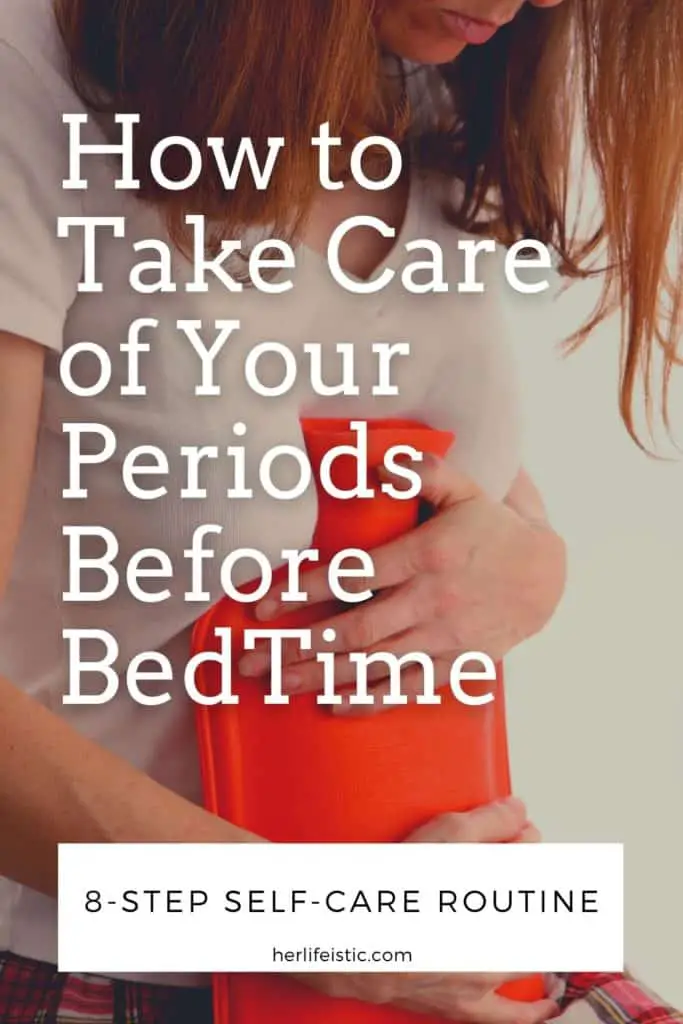For many women, it is difficult to sleep well when they are on their periods. They might suffer from menstrual symptoms such as headaches, cramps, and anxiety, which makes it difficult to go to bed. The shift in hormones also interferes with your sleep cycle, and this can interfere with how you feel the next day.
It can become a vicious cycle that makes you feel exhausted day after day. It is important to understand how you can take care of your periods so that you can get more rest and wake up feeling refreshed.
*We earn a commission for products purchased through affiliate links on our site.
Ways That Your Periods Can Impact Your Sleep Cycle
If you don’t take steps to promote sleep during your periods, they can disrupt your sleep cycle. The change in your hormonal balance can reduce the amount of serotonin that your body produces, and this hormone helps to regulate your sleep cycle.
In addition, research shows that some women have a lower response to melatonin, which is another hormone that signals your body when it is time to sleep and to awaken. This can be disruptive to your entire sleep cycle, which can leave you feeling exhausted.
It is important to take steps to help you get restful sleep during your periods so that you are impacted as little as possible. Take a look at the following eight steps you can take.
8-Step Self-Care Routine Before Bed Time
1. Make Sure That Your Bedroom Is Cool
When you get ready for bed, your hormones actually signal that it is time to lower your body temperature for sleeping. When you are on your period, you might have hormone shifts that interfere with your body’s natural sleep preparation process, which can make it difficult for you to fall asleep.
You can address this by preparing your bedroom before you go to sleep. Set your thermostat below 68 degrees, which will help your body prepare for a comfortable temperature for restful sleep.
2. Make Sure That You Exercise During the Day
Exercise is important for promoting sleep. When you exercise, it gets your body working. It also raises your body temperature, and when you relax after exercise, your body temperature drops back down. This is a great way to mimic the body’s natural process of preparing for sleep. The reduction in body temperature helps to prepare you for sleep.
You can also do a few yoga stretches before you go to bed. This has the same effect, and it can help reduce cramping.

3. Look for a Comfortable Position
When you are preparing to go to sleep, you should try out several different positions to find one that is comfortable. If you are uncomfortable, you are likely to toss and turn all night.
There are different kinds of pillows that can offer support and help you reduce your symptoms from your periods. The key is to find your ideal sleeping position before you go to sleep. Some people prefer to sleep on their sides with a body pillow for support. This helps to regulate your breathing.
Others find that the fetal position helps. Make sure that you try out different positions so that you know which ones work best for you.
4. Plan Your Diet to Promote Sleep
Your diet also has an impact on how your body functions at night.
When you have your periods, you may feel bloated or full, and some people find that warm, heavy foods are comforting. However, eating these foods too close to bedtime can make you feel nauseous and give you indigestion. Make sure that you eat earlier before it is time to go to sleep. Give your body time to digest the food.
Some foods can actually encourage sleep, such as chicken, eggs, and other dairy products. They contain tryptophan, which is an amino acid that makes you feel tired.
5. Limit Your Caffeine Intake
Another way to prepare for sleep during your periods is to limit your caffeine intake.
Caffeine can make your cramps worse because it is known to cause your blood vessels to narrow. It is also a stimulant, and it can keep you awake. Caffeine is in coffee, tea, soda, and chocolate, so make sure that you avoid these before bed time.

6. Take Time to Destress
Stress is a huge factor in your ability to sleep. It can make your heart rate go up, and it can put your body and mind into a state of hyperarousal that makes it impossible to relax and fall asleep.
Sometimes people get stressed by not being able to sleep, which makes it even more difficult.
You can take time to read a book, light a scented candle, relax and listen to music, or go through some yoga poses with breathing techniques. You will be able to use these exercises to prepare your body for sleep.
Related
7. Keep a Sleep Journal
If you want to get a handle on how your periods are impacting your sleep, keeping a sleep journal can be very helpful.
You will write down what you did before you went to bed, and then write about the quality of your sleep the following morning.
You may notice patterns emerge that show you things that work well for your body, as well as things that do not. A sleep journal can give you great insight into what works best for you.

8. Take a Warm Bath
Taking a warm bath before bed can help your body prepare for sleep, and it will also relieve cramping and other symptoms related to your periods.
You can use a relaxing lavender scented product to help signal to your body that it is time for sleep. The warm bath naturally raises your body temperature, and the drop in temperature when you go to bed signals to your body that it is time for sleep.
Final Words
Having your period can be difficult and disruptive to your sleep schedule. You can take steps to improve the quality of your sleep by focusing on your body’s natural rhythms. Exercise, diet, and stress all play a role in your ability to sleep well, so make sure that you prioritize your self-care routine.








Comments are closed.